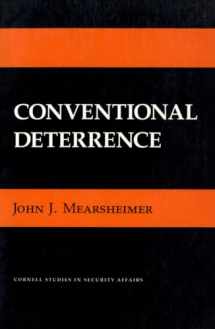
Conventional Deterrence (Cornell Studies in Security Affairs)
Book details
Summary
Description
Conventional Deterrence is a book about the origins of war. Why do nations faced with the prospect of large-scale conventional war opt for or against an offensive strategy? John J. Mearsheimer examines a number of crises that led to major conventional wars to explain why deterrence failed. He focuses first on Allied and German decision making in the years 1939–1940, analyzing why the Allies did not strike first against Germany after declaring war and, conversely, why the Germans did attack the West. Turning to the Middle East, he examines the differences in Israeli and Egyptian strategic doctrines prior to the start of the major conventional conflicts in that region. Mearsheimer then critically assays the relative strengths and weaknesses of NATO and the Warsaw Pact to determine the prospects for conventional deterrence in any future crisis. He is also concerned with examining such relatively technical issues as the impact of precision-guided munitions (PGM) on conventional deterrence and the debate over maneuver versus attrition warfare.Mearsheimer pays considerable attention to questions of military strategy and tactics. Challenging the claim that conventional detrrence is largely a function of the numerical balance of forces, he also takes issue with the school of thought that ascribes deterrence failures to the dominance of "offensive" weaponry. In addition to examining the military consideration underlying deterrence, he also analyzes the interaction between those military factors and the broader political considerations that move a nation to war.


We would LOVE it if you could help us and other readers by reviewing the book
Book review





